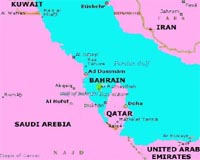| . |  |
. |
Washington (AFP) March 14, 2011 The United States warned Gulf states on Monday to respect the rights of the people of Bahrain, after troops from nations including Saudi Arabia crossed into the violence-wracked kingdom. But Washington said the entry of foreign troops was "not an invasion" and declined to call for them to be pulled back from the strategically important country, rocked by Shiite protests against the minority Sunni government. "We are calling on the countries in the region to show restraint," said White House spokesman Jay Carney, after the Gulf Cooperation Council invoked a collective security agreement and agreed to reinforce Bahrain forces. "We urge the government of Bahrain... as well as other GCC countries, to exercise restraint and not to meet the non-violent protests of people legitimately expressing their concerns... with any kind of physical violence." US Secretary of State Hillary Clinton also called for restraint Monday when she met her counterpart from the United Arab Emirates in Paris and expressed "deep concern about the dangerous situation," a US official said. More than 1,000 Saudi troops have entered Bahrain, where anti-regime protests have raged for a month, a Saudi official said Monday, as demonstrators took over Manama's central business district. The United Arab Emirates also said it had sent some 500 police to help "defuse tension," according to Foreign Minister Sheikh Abdullah bin Zayed al-Nahayan. It was not clear if other GCC members were participating. The GCC groups Bahrain, Kuwait, Oman, Qatar, Saudi Arabia and the UAE. The Pentagon said it had no advance warning that Saudi troops and others were being deployed to keep a lid on protests in the Gulf kingdom, despite the fact that Defense Secretary Robert Gates was in Bahrain a few days ago. Neither Gates, nor top US military officer Admiral Mike Mullen, "were given any indication that Saudi or other GCC forces would deploy to Bahrain," defense spokesman Colonel David Lapan said in remarks emailed to AFP. "The Saudi/GCC intervention decision was made in light of escalating clashes between protesters and the opposition on Sunday" -- after the departure of Gates. "We have communicated to all parties our concerns regarding actions that could be provocative or inflame sectarian tensions." Bahrain, a tiny, oil-rich ally of the United States hosts the headquarters of the US Fifth Fleet and is adjacent to an oil-producing province in Sunni-ruled Saudi Arabia where Shiites also complain of unfair leadership. Though Carney urged restraint, he did not accept a reporter's invitation to call for Saudi and other foreign troops to leave Bahrain. "This is not an invasion of a country," Carney said, walking a fine diplomatic line. Earlier, National Security Council spokesman Tommy Vietor condemned violence in Manama on Sunday, and said the White House was concerned that some of the clashes were instigated by demonstrators. The Saudi government said it had responded to a call for help from its neighbor as Saudi-led forces from the Gulf region's joint Peninsula Shield Force crossed the causeway separating the two countries. It said that under a GCC agreement "any harm done to the security of a member state is considered a harm done to the security of all members." The Shiite-led opposition alliance said any foreign force would be treated as an invading army. "We consider the arrival of any soldier, or military vehicle, into Bahraini territory... an overt occupation of the kingdom of Bahrain and a conspiracy against the unarmed people of Bahrain," said an opposition statement. In a major concession to the opposition demands, Crown Prince Salman said Sunday he supported the creation of a parliament with full powers and pledged to tackle corruption and sectarian tensions. The GCC move came just days after Gates left the kingdom after talks with the king and the crown prince. Although there were no signs Shiite-led Iran was behind unrest in the Gulf kingdom or elsewhere in the region, Tehran would likely work to meddle in Bahrain's politics amid sectarian tensions, Gates said. "I expressed the view that we had no evidence that suggested that Iran started any of these popular revolutions or demonstrations across the region," said Gates.
Share This Article With Planet Earth
Related Links
 If Bahrain fails to reform, Iran will meddle: US
If Bahrain fails to reform, Iran will meddle: USAboard A Us Military Aircraft (AFP) March 12, 2011 US Defense Secretary Robert Gates said on Saturday that Bahrain's leaders needed to move quickly to adopt major reforms or else risk interference from Iran. After talks with Bahrain's king and crown prince, Gates said he was hopeful the government would take "far-reaching steps" but warned that countries across the region could no longer ignore popular demands for democracy. Although the ... read more |
|
| The content herein, unless otherwise known to be public domain, are Copyright 1995-2010 - SpaceDaily. AFP and UPI Wire Stories are copyright Agence France-Presse and United Press International. ESA Portal Reports are copyright European Space Agency. All NASA sourced material is public domain. Additional copyrights may apply in whole or part to other bona fide parties. Advertising does not imply endorsement,agreement or approval of any opinions, statements or information provided by SpaceDaily on any Web page published or hosted by SpaceDaily. Privacy Statement |